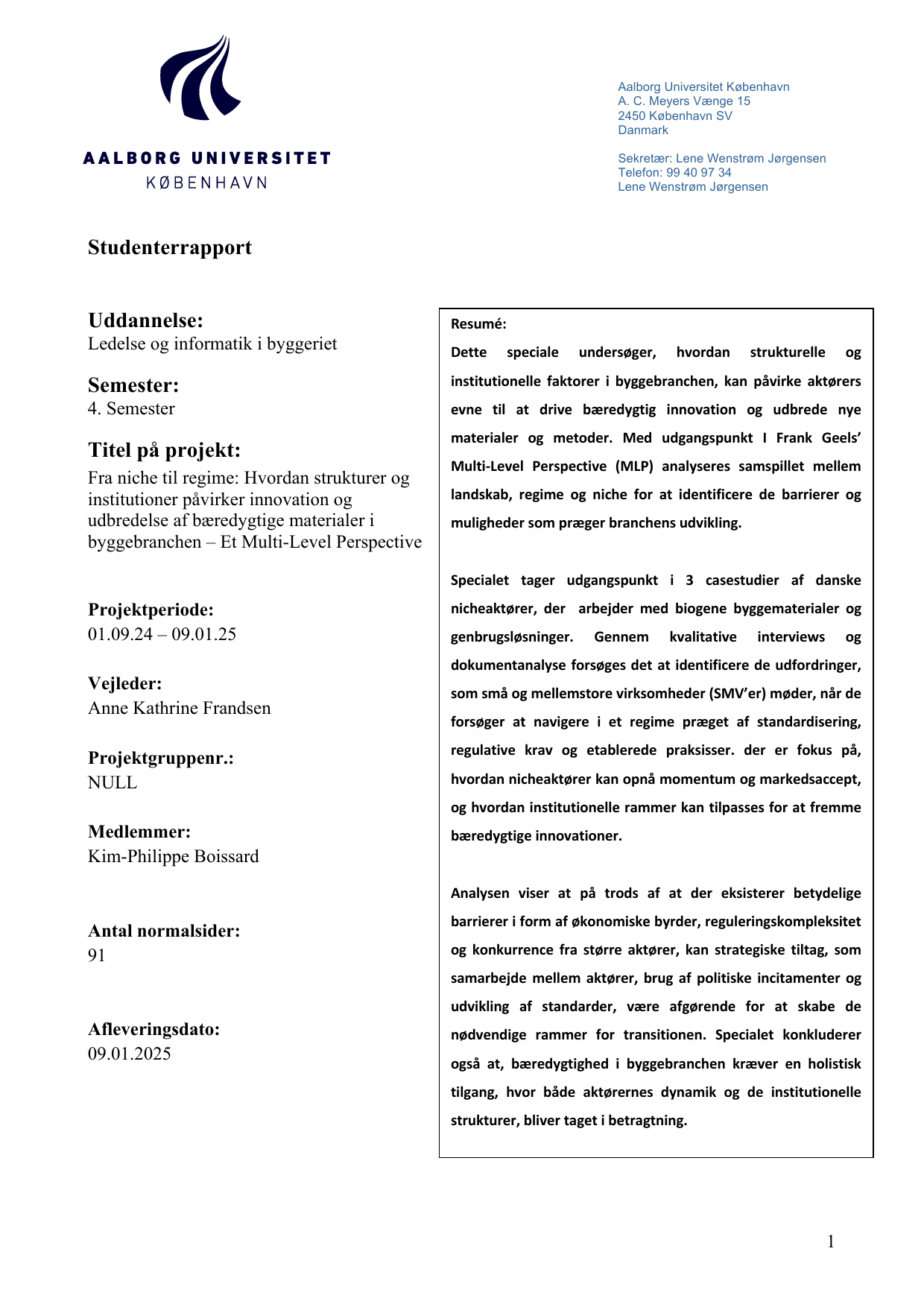
Fra niche til regime Hvordan strukturer og institutioner påvirker innovation og udbredelse af bæredygtige materialer i byggebranchen - Et Multi-Level Perspective
Oversat titel
From Niche to Regime How Structures and Institutions Influence Innovation and the Adoption of Sustainable Materials in the Construction Industry - A Multi-Level Perspective
Forfatter
Semester
4. semester
Udgivelsesår
2025
Afleveret
2025-01-08
Antal sider
91
Abstract
Resumé: Dette speciale undersøger, hvordan strukturelle og institutionelle faktorer i byggebranchen, kan påvirke aktørers evne til at drive bæredygtig innovation og udbrede nye materialer og metoder. Med udgangspunkt I Frank Geels’ Multi-Level Perspective (MLP) analyseres samspillet mellem landskab, regime og niche for at identificere de barrierer og muligheder som præger branchens udvikling. Specialet tager udgangspunkt i 3 casestudier af danske nicheaktører, der arbejder med biogene byggematerialer og genbrugsløsninger. Gennem kvalitative interviews og dokumentanalyse forsøges det at identificere de udfordringer, som små og mellemstore virksomheder (SMV’er) møder, når de forsøger at navigere i et regime præget af standardisering, regulative krav og etablerede praksisser. der er fokus på, hvordan nicheaktører kan opnå momentum og markedsaccept, og hvordan institutionelle rammer kan tilpasses for at fremme bæredygtige innovationer. Analysen viser at på trods af at der eksisterer betydelige barrierer i form af økonomiske byrder, reguleringskompleksitet og konkurrence fra større aktører, kan strategiske tiltag, som samarbejde mellem aktører, brug af politiske incitamenter og udvikling af standarder, være afgørende for at skabe de nødvendige rammer for transitionen. Specialet konkluderer også at, bæredygtighed i byggebranchen kræver en holistisk tilgang, hvor både aktørernes dynamik og de institutionelle strukturer, bliver taget i betragtning.
This thesis examines how structural and institutional factors in the construction industry can influence actors’ ability to drive sustainable innovation and promote the adoption of new materials and methods. Using Frank Geels’ Multi-Level Perspective (MLP) as a framework, the interplay between landscape, regime, and niche is analyzed to identify the barriers and opportunities shaping the industry’s development. The study is based on three case studies of Danish niche actors working with biogenic construction materials and recycling solutions. Through qualitative interviews and document analysis, the challenges faced by small and medium-sized enterprises (SMEs) navigating a regime characterized by standardization, regulatory requirements, and established practices are explored. The focus is on how niche actors can gain momentum and market acceptance and how institutional frameworks can be adapted to foster sustainable innovations. The analysis reveals that, despite significant barriers such as economic burdens, regulatory complexity, and competition from larger actors, strategic measures such as collaboration between stakeholders, the use of political incentives, and the development of standards can be crucial in creating the necessary conditions for a successful transition. The thesis concludes that sustainability in the construction industry requires a holistic approach that considers both the dynamics of actors and the institutional structures shaping their actions.
